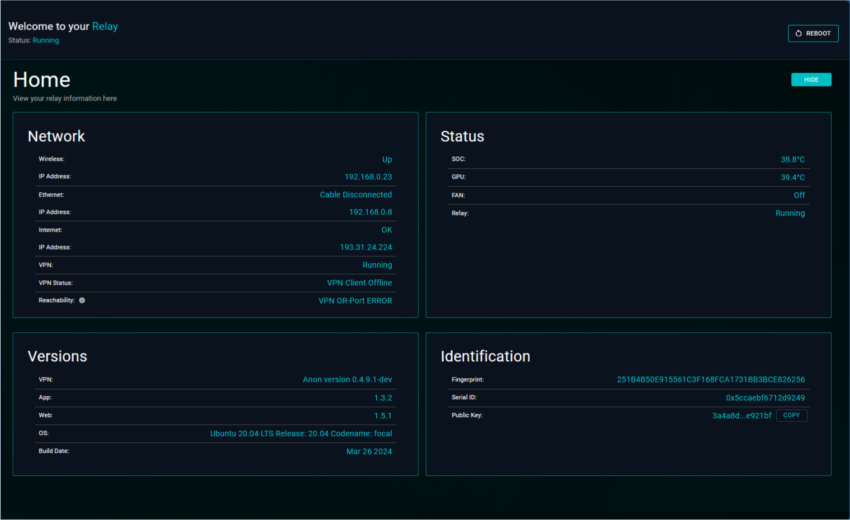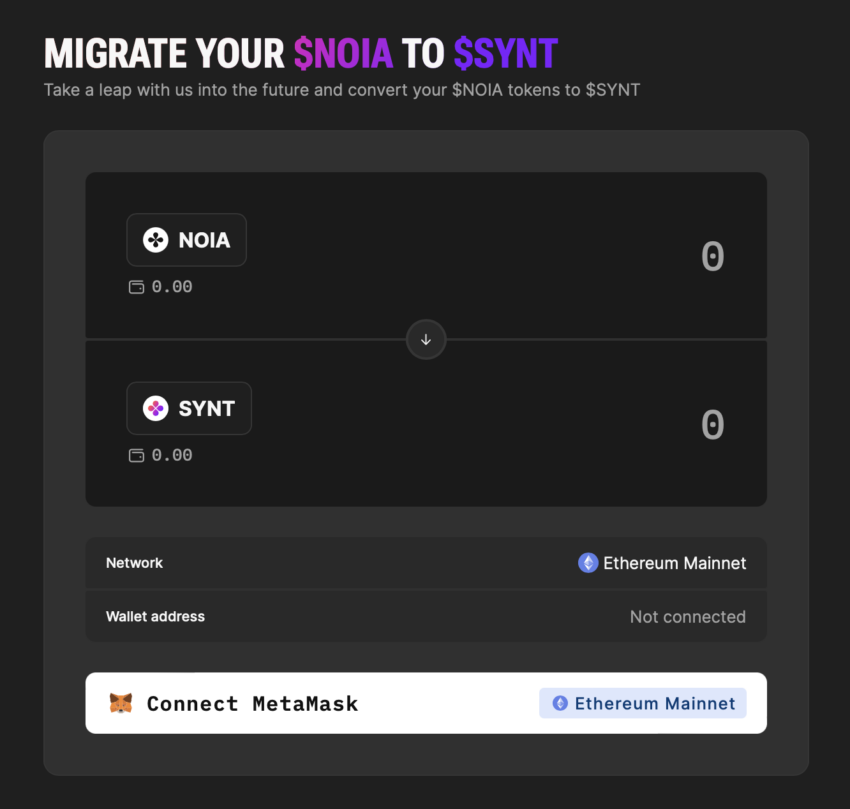Decentralized Physical Infrastructure Networks (DePin) are transforming the tech by enabling decentralized projects in real-world infrastructure.
Here’s what happened recently in the DePin sector: leading privacy protocol ATOR rebranded to Anyone, decentralized personal information network Verida raised $5 million, and Layer-1 blockchain Synternet launched its mainnet on the Cosmos network.
ATOR Protocol Rebrands to Anyone
One of 2023’s most successful DePin projects, ATOR, has rebranded as Anyone, marking a switch from the dark web-related browser Tor to mainstream internet privacy. The new name reflects this broader vision: transforming the internet for every user, not just the technically inclined or fringe groups.
The Anyone’s native token is live and actively traded by former ATOR holders. Exchange-based holders will automatically receive the new token after a brief pause.
Originally an incentive protocol for The Onion Router (Tor), ATOR built a strong community focused on running relays for bandwidth rewards. Now, Anyone is creating its own network, leveraging onion routing technology for broader applications. They aim to make privacy the default standard for all internet users and services.
Read more: What Is DePIN (Decentralized Physical Infrastructure Networks)?

The new DePIN network, Anon, is promoted as a “modular privacy layer for the internet.” Unlike traditional VPNs or browser apps, Anon enables any application to connect to the network either manually or through code. This also allows new apps to be built with privacy as a default setting. Anyone aims to shift privacy responsibility from users to being the standard in every product and service.
Verida Raises $5 Million in Seed and Strategic Funding
Verida, a decentralized data network and self-custody wallet, has raised over $5 million, reaching a valuation of $50 million. Investors in this funding round include O-DE Capital Partners, ChaiTech Ventures, Simurg Labs, and existing investors such as Gate Labs, HASH CIB, Bison Capital, Amesten Capital, and Evan Cheng of Mysten Labs.
Community pre-sales of the Verida Storage Credit token also contributed to the funding. The newly raised funds will help develop Verida’s personal data ownership system. The network plans to offer decentralized storage and encryption for users’ personal information. This means data will be stored across multiple nodes managed by different network participants.
“Verida is poised to disrupt the AI landscape by putting users back in control of their data, unlocking more secure, privacy-preserving personalized AI for everyone,” a Verida representative noted.
Read more: Top Web3 Privacy Challenges & How to Overcome Them
Verida has secured over 20 ecosystem partners, including Polygon ID, NEAR, Partisia, Redbelly, zkPass, Kima, Nillion, and cheqd. This growing network strengthens Verida’s presence within the industry.
Synternet Goes Mainnet on Cosmos
Synternet, the Layer-1 blockchain powering data infrastructure for projects building in the AI, DeFi, DePIN, and IoT space, launched its mainnet on Cosmos. This move supports a new decentralized data economy, allowing developers to create applications using real-time, trustless data streams from all major chains.
The mainnet launch also initiates the token migration from NOIA to SYNT. The full token utility will be unlocked on July 29, when the bridge to Cosmos becomes operational.
“The launch of Synternet’s mainnet on Cosmos is a technical milestone signaling the beginning of a new era for the decentralized data economy. With $SYNT, we’re providing real utility, enabling users to pay for data services at reduced fees and fostering a more inclusive and efficient ecosystem,” stated Jonas Simanavicius, CTO at Synternet.
Read more: Cosmos: A Comprehensive Guide to What It Is and How It Works

These developments indicate a promising future for DePIN, with more prominent players entering the sector and new solutions emerging. While DePIN is still in its early stages and has some flaws, it allows for the exchange of tokens between synthetic and real-world assets. This supports traditional infrastructure by providing last-mile coverage in areas where conventional models are not economically feasible.
Decentralized Physical Infrastructure Networks (DePin) are transforming the tech by enabling decentralized projects in real-world infrastructure.
Here’s what happened recently in the DePin sector: leading privacy protocol ATOR rebranded to Anyone, decentralized personal information network Verida raised $5 million, and Layer-1 blockchain Synternet launched its mainnet on the Cosmos network.
ATOR Protocol Rebrands to Anyone
One of 2023’s most successful DePin projects, ATOR, has rebranded as Anyone, marking a switch from the dark web-related browser Tor to mainstream internet privacy. The new name reflects this broader vision: transforming the internet for every user, not just the technically inclined or fringe groups.
The Anyone’s native token is live and actively traded by former ATOR holders. Exchange-based holders will automatically receive the new token after a brief pause.
Originally an incentive protocol for The Onion Router (Tor), ATOR built a strong community focused on running relays for bandwidth rewards. Now, Anyone is creating its own network, leveraging onion routing technology for broader applications. They aim to make privacy the default standard for all internet users and services.
Read more: What Is DePIN (Decentralized Physical Infrastructure Networks)?

The new DePIN network, Anon, is promoted as a “modular privacy layer for the internet.” Unlike traditional VPNs or browser apps, Anon enables any application to connect to the network either manually or through code. This also allows new apps to be built with privacy as a default setting. Anyone aims to shift privacy responsibility from users to being the standard in every product and service.
Verida Raises $5 Million in Seed and Strategic Funding
Verida, a decentralized data network and self-custody wallet, has raised over $5 million, reaching a valuation of $50 million. Investors in this funding round include O-DE Capital Partners, ChaiTech Ventures, Simurg Labs, and existing investors such as Gate Labs, HASH CIB, Bison Capital, Amesten Capital, and Evan Cheng of Mysten Labs.
Community pre-sales of the Verida Storage Credit token also contributed to the funding. The newly raised funds will help develop Verida’s personal data ownership system. The network plans to offer decentralized storage and encryption for users’ personal information. This means data will be stored across multiple nodes managed by different network participants.
“Verida is poised to disrupt the AI landscape by putting users back in control of their data, unlocking more secure, privacy-preserving personalized AI for everyone,” a Verida representative noted.
Read more: Top Web3 Privacy Challenges & How to Overcome Them
Verida has secured over 20 ecosystem partners, including Polygon ID, NEAR, Partisia, Redbelly, zkPass, Kima, Nillion, and cheqd. This growing network strengthens Verida’s presence within the industry.
Synternet Goes Mainnet on Cosmos
Synternet, the Layer-1 blockchain powering data infrastructure for projects building in the AI, DeFi, DePIN, and IoT space, launched its mainnet on Cosmos. This move supports a new decentralized data economy, allowing developers to create applications using real-time, trustless data streams from all major chains.
The mainnet launch also initiates the token migration from NOIA to SYNT. The full token utility will be unlocked on July 29, when the bridge to Cosmos becomes operational.
“The launch of Synternet’s mainnet on Cosmos is a technical milestone signaling the beginning of a new era for the decentralized data economy. With $SYNT, we’re providing real utility, enabling users to pay for data services at reduced fees and fostering a more inclusive and efficient ecosystem,” stated Jonas Simanavicius, CTO at Synternet.
Read more: Cosmos: A Comprehensive Guide to What It Is and How It Works

These developments indicate a promising future for DePIN, with more prominent players entering the sector and new solutions emerging. While DePIN is still in its early stages and has some flaws, it allows for the exchange of tokens between synthetic and real-world assets. This supports traditional infrastructure by providing last-mile coverage in areas where conventional models are not economically feasible.







